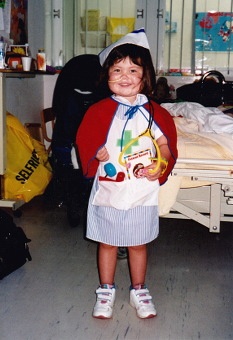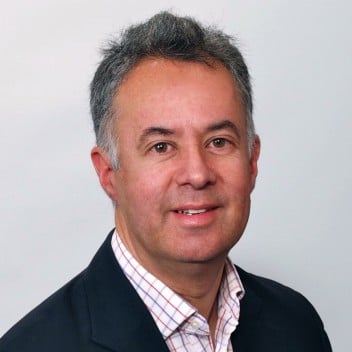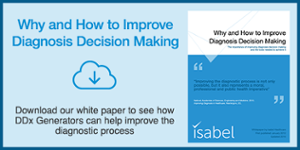- Privacy Policy
- Terms & Conditions
- Contact us
- ©Isabel Healthcare 2025
"The Cost of Assuming your Doctor Knows Best" - Response to Dr Parkash
 Vinita Parkash, MD, a professor of pathology at Yale School of Medicine, published a blogpost last week on “The Cost of Assuming your Doctor Knows Best.” This candid post was extremely interesting, as was the comments section, and we wanted to give our take on the whole thing on our own blog.
Vinita Parkash, MD, a professor of pathology at Yale School of Medicine, published a blogpost last week on “The Cost of Assuming your Doctor Knows Best.” This candid post was extremely interesting, as was the comments section, and we wanted to give our take on the whole thing on our own blog.
A Brave Step
First of all, it was refreshing to see such an honest discussion on the mistakes that physicians, as humans, do make. As Parkash says herself, in the medical field “admitting a mistake is an admission of failure. Discussing one is worse still,” so it was brave to choose to talk about physician error as a whole, and her own experience of misdiagnosis due to physician error specifically. Overall Parkash succeeded in getting across both the personal damage hiding a medical mistake can have on the physician and patient, and also the wider consequences this can have on the medical industry. Covering up our mistakes time after time perpetuates the lack of communication around physician error, and more importantly doesn’t stop the same error happening again. As Parkash said of her own personal account, “Had I shared the story of my own inability to correctly diagnose this woman, might we have been able to describe this type of cancer sooner and perhaps saved several other women from a similar plight? I will never know.”
Research into Diagnostic Error
Parkash mentioned two studies that we have blogged about and published on our website, along with many other reports and studies. The first that Parkash mentions is the 1999 report “To Err is Human: Building a Safer Health System” and the second is the 2015 report “Improving Diagnosis in Healthcare,” both published by the National Academy of Medicine (formerly the Institute of Medicine). We agree with Parkash when she points out that diagnostic error was not looked at in as much depth as other causes of medical error after the 1999 report was published. Indeed, 1999 was the year that Isabel Maude, the inspiration behind Isabel Healthcare, suffered her near-fatal misdiagnosis, and led CEO Jason Maude to challenge how much was being done to improve the diagnostic processes in medicine. He was, however, one of the very few people at the time prepared to ask these difficult questions and come up with solutions, and this shows how much physician error was and still is covered up and met with shame or guilt.
Parkash then goes on to discuss the 2015 report, in which diagnostic error is highlighted as the most expensive and harmful of all medical errors. The fact that diagnostic error was not given as much attention as other forms of medical error in the last fifteen years, has meant we now have to deal with it as a much bigger problem. The culture of discussion between doctors themselves, and doctors and patients, is in need of improvements, and until this happens, diagnostic error will not improve enough. More complex diseases and presentations, as Parkash mentions, are also revealing a bigger need to discuss and use every tool around us in order to improve the diagnostic process and reduce physician error.
Answering Some Concerns
The comments section of this blogpost was very interesting and people made some good points, and raised genuine concerns which we come across regularly. Concerns of medical error because of an over-dependence on technology, or simply a lack of attention due to distractions of computers or smart-phones, is a question that the the medical technology industry comes up against a lot. It is true that technology can be distracting, and can even put a barrier between the patient and doctor during examination and diagnosis when used in a conversation’s stead, but that shouldn’t be blamed on the technology itself. This is an issue with the way we use technology in healthcare settings, and the cultures surrounding it. When used properly, involving the patient and explaining the process, technology is a positive force in an examination room. Isabel helps doctors to see all the possible diagnoses for one patient, but only after there has been a full discussion and examination of the patient’s clinical features, even including test results. Artificial Intelligence (AI), and technology as a whole, has been developing at an enormous rate in the last decade, and as such it is now highly accurate and sophisticated, and always increasingly so. AI should never, and will never, replace a doctor’s judgement or intuition, but what it can do is improve the diagnostic process with knowledge and facts, helping the doctor to focus on the intuition and human side of working with patients.
AI and The Healthcare World
The final message Parkash leaves us with is that “we need to get rid of the stigma of error among physicians and provide support and education for them,” and we couldn’t agree more. In any other industry, if you were told to cover up your mistakes and ignore them, you would never be expected to grow as a business. Take for example, a grocery shop. If a member of staff was labelling the produce with the wrong prices day after day, but when they realised they had done this, covered it up and didn’t tell anyone, not only would the sales figures not add up, but they also leave the problem open for someone else to price the produce incorrectly. What’s more, that member of staff is likely to get punished more severely for covering up their mistake, than if they had simply rectified the situation sooner. In all walks of life we are told to own up to our mistakes and learn from them, but in the world of diagnosis, this is ignored. This furthers the disconnect between doctor and patient, and we start to forget the one thing that really matters - the correct diagnosis.
There are many avenues to pursue when looking at improving diagnosis, from changing the culture of silence, to recording and discussing medical errors as Parkash mentions. At Isabel our main mission is to improve diagnosis, and we are able to contribute with supportive tools that will reduce error, and also help make cases more well documented without added administrative burden, which in turn will allow physicians to discuss and learn from their mistakes. Parkash says “computers and artificial intelligence will necessarily feature in big ways to help us capture and sift through information and make the right diagnosis” and it is diagnostic tools like Isabel that can help, but not replace, physicians as their job becomes more complex.
The Isabel Healthcare Blog uploads regular posts discussing current affairs in the medical world, and our thoughts on AI and diagnosis in the Healthcare Industry. We also blog on various symptoms and diseases, helping to provide medical professionals and patients alike with the information they need to reach a correct diagnosis together. You can subscribe to our blog for email updates when we upload, and have you also seen our white paper called "Why and How to Improve Diagnosis?"

Jason Maude
Jason is the CEO and Co-founder of Isabel. Prior to co-founding Isabel, Jason spent 12 years working in finance and investment banking across Europe. His daughter, Isabel, fell seriously ill following a misdiagnosis in 1999 and this experience inspired Jason to abandon his city career and create Isabel Healthcare Ltd.
Subscribe Here!
Recent Posts
Isabel DDx Companion with ChatGPT Integration - to help you diagnose even faster
At Isabel Healthcare, we’ve always been driven by one goal: to make clinical reasoning faster,..Virtual Triage: Do more questions lead to better patient outcomes?
One of the common misconceptions related to virtual triage / symptom checker tools is that the more..List Of Categories
- Differential Diagnosis Decision Support
- Differential diagnosis
- Symptom Checker
- Symptoms
- Medical Error
- Patient Disease Information
- Disease
- Clinical Decision Support
- Diagnostic Decision Support
- Isabel 1 Minute Read
- Diagnosis Error
- Diagnosis Skills Cases
- Healthcare Informatics
- Clinical Reasoning
- Evidence-based Medicine
- Medical Education
- Patient Engagement
- Symptom Triage
- Nurse Practitioner Education
- Nursing Decision Support
- Partnership
- Public Health
- COVID-19
- EHR
- Patient Empowerment
- Patient Safety
- rare disease

Start your FREE Trial today
Try the Isabel Pro DDx generator for 30-days - no payment card details required.




